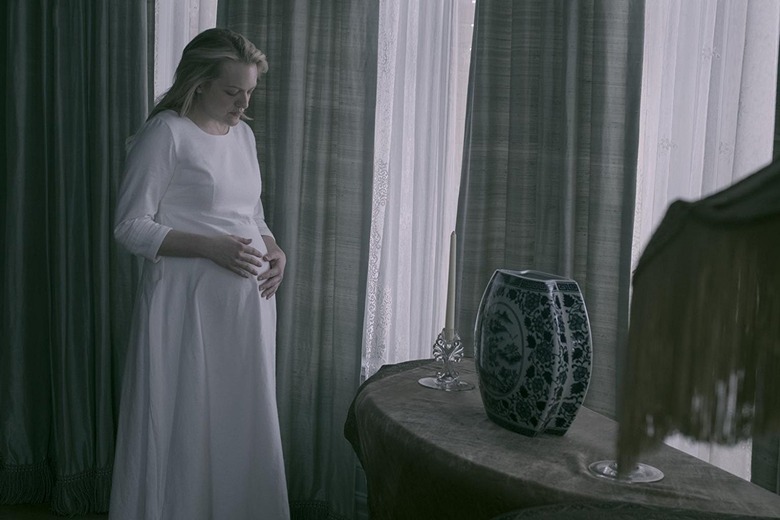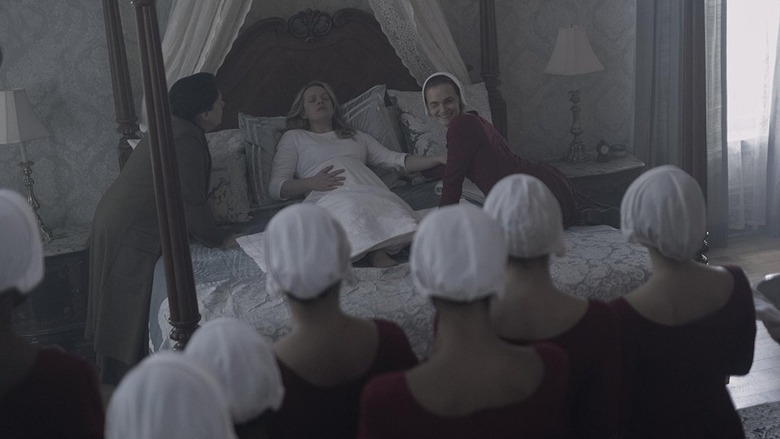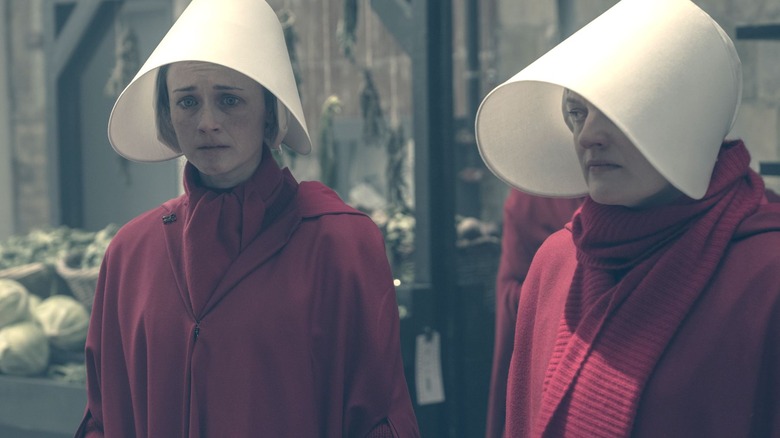'The Handmaid's Tale' Delivers Its Most Brutal And Horrifically Timely Episode With "The Last Ceremony"
(We're going to kickstart our weekly The Handmaid's Tale review by answering one simple question: Who suffered the most?)
The screener for this week's episode of The Handmaid's Tale came with a curious bolded warning: "This episode has content that may be extra sensitive for some viewers." It's an alarming piece of cautionary text for a show that has regularly trafficked in misery.
This season of The Handmaid's Tale has upped the suffering to ludicrous levels, so much so that at times the acclaimed show has felt no better than misery porn. At what point does watching The Handmaid's Tale just become a sadistic chore for us every week? While early episodes showed promise of an expanded world and affecting character arcs outside of June's POV, The Handmaid's Tale was all too eager to snap back to the status quo and to the abject misery that it was so known for in the first Emmy-winning season. But I will say that at least "The Last Ceremony" makes an effort to give us an emotional anchor that makes the episode more impactful than earlier episodes' barrage of bleak imagery. But is it enough to offset one of the show's most violently distressing scenes?
Who Suffered the Most? June
Rape has always been part of The Handmaid's Tale's DNA. The revolting Ceremony, in which the Handmaid is held down by the Wife while the Commander rapes her, was done in a solemn, ritualistic manner, but it was rape nonetheless. But the Ceremony, so horrific the first time we saw it, was put in the background for most of the season — until now. We're reintroduced to the Ceremony with Emily, gaunt and emaciated after her time at the Colonies, as June's voiceover gives a remarkably meta breakdown of the Ceremony. "You treat it like a job...that makes it bearable." But those words take on a frighteningly different tone later in the episode.
Thanks to her pregnancy, June had been protected from bodily violence for much of the season. Her spirit and mind were both broken at different times, but Aunt Lydia and the Waterfords always treated her body like delicate glass. However, after a false labor triggers a cruelty in Serena that we hadn't seen since last season and Fred becomes enraged at June's request to see her daughter Hannah, the Waterford's hatch a plot to induce June into labor "the natural way." It doesn't become clear what that way is until June is called into the Waterford's bedroom (preceded by Rita ominously promising June "I'll tell the baby about you"). What follows is a repeat of the Ceremony but in the most brutal and traumatizing manner possible — with Serena and Fred forcing June onto the bed as she screams. Then comes the kicker: June repeats her opening monologue before she goes silent and whispers, dead-eyed, "I'm not here."
It's an appalling scene. And one that reminds me so violently of other rape scenes on TV (one of which was so gratuitous that I up and quit the show) that it makes me wonder if The Handmaid's Tale is truly worth watching at this point. What sets it apart is not just that it's done to a pregnant woman and not just that June is screaming in protest, but that it's adding yet another trauma to a woman who has already suffered enough.
False Alarm
The thing is, the episode had started off on a hopeful note. But the show had been on an optimistic streak for the past few episodes, which meant it could only go downhill from there. After June happily relayed the news to the other Handmaids at the supermarket that Moira had escaped to Canada, only to be met with a non-response from the dejected Emily, June goes into labor. Thus begins the flurry of preparations for the baby, all of which is very familiar to us. The Wives surround Serena in serene circle with candles and a harp playing, while the Handmaid's arrive to help June, chattering and giggling like it's a school trip. Only Emily gives the look of consternation that June feels, knowing she'll be separated from her baby and kicked out as soon as the delivery is over.
But Serena's ecstasy is interrupted when Lydia calls her out of her Wives ceremony and brings her to June, sitting on the bed and looking incredibly smug. June had gone into false labor, Lydia informs Serena, who begins to seethe with that familiar contempt. "I'm sorry Mrs. Waterford," June all but leers and, unable to help herself, gets in one last snarky comeback as Serena leaves: "It's been lovely but I think it's best we don't ever see each other again."
Emboldened by her false labor, June visits Fred's office, who lets her in despite protesting that it's late. But once she pleads with him to let her be moved to her daughter's district, Fred becomes enraged, muttering that he's been too lenient on her and ordering her out. This incident for Fred and the false labor for Serena are apparently the triggering incidents that push them to band together (forgetting old abuses, apparently) and put June in her place. It's interesting that both Fred and Serena become infuriated whenever June appeals to their humanity — particularly when she asks about her daughter — causing them to act out even more aggressively against her. Is it guilt? A reminder of the horrible things they've done? Or perhaps resentment as June seems to suggest, again leaving Fred's office with the last word, "You have no idea what it's like to have a child of your own flesh and blood and you never will."
Separation Anxiety
I'm not going to lie: this episode was difficult to write about. Not only because of the forewarned rape scene, but because of the terrifyingly timely subplot of parental separation that feels ripped from the headlines. But, oddly, June's reunion with Hannah — as heartrending and hopeless as it is — is the one scene that grounds the episode and makes it feel like more than an exercise in sadism.
Perhaps feeling guilty after violently raping her, Fred gives June the "gift" of seeing her daughter again, having Nick drive her out to an isolated mansion where her daughter is waiting for her with a Martha. June, overjoyed, immediately hugs Hannah who standoffishly hides behind her Martha, not responding to June calling her name. "Her name is Agnes now," the Martha says. But not to be deterred, June presses on.
In an unbroken 10-minute scene, June and Hannah work through the betrayal, the abandonment, and the grief of separation. It's a profoundly affecting scene, as June chats warmly with Hannah until her bitterness toward her mother (Hannah's indignant "Why didn't you try looking for me harder?" hits like a ton of bricks) melts away and she's forced to go through the pain of separation from June again. For anyone who has heard those infamous recordings, Hannah's cries for her mommy are painfully real and hit close to home. It's astonishingly timely for a show that was filmed months ago, but the parallels to families being separated at the Mexican border and June and Hannah being wrenched apart are almost too much to bear. But while this scene is devastating, it sets itself apart from the rape scene by tapping into the real human emotions that make this situation so tragic. It's not bleak for bleak's sake, and while that's no consolation, it does prove that The Handmaid's Tale can be more than misery porn.
But The Handmaid's Tale can't leave us without a painfully ironic ending. Hannah's hasty departure is soon explained by the arrival of Guardians at the mansion, who shoot and detain Nick, leaving June hiding alone in the house in the middle of nowhere. As she runs out in a panic, there comes the realization that she's finally free — only Nick and Fred are aware of her whereabouts — but not in the way that she would hope.
Tale Tidbits



